- Home
- Georgette Heyer
Acting on Impulse Page 10
Acting on Impulse Read online
Page 10
He is the “creature of impulse” and it is his “ingenuous boyishness” that drives the unlikely but entertaining plot. The action is fast-paced, the dialogue is pure 1920’s literary England, with such smile-inducing phrases as “topping,” “top-hole” and “awfully bucked,” and the plot has enough twists and turns to keep the reader amused. Heyer’s hand is sure throughout the story and with some wit and more good humour than she would achieve in Helen, she brings the tale to its obvious conclusion.
Though only her second short for The Red Magazine, “Acting on Impulse” would be Heyer’s last for that publication.
ACTING ON IMPULSE
I.
EVERYONE who knew him or had ever known him agreed that Kenneth Mount was mad. His nurse had said it most emphatically when, at the age of five, Kenneth had left his bed while she was having dinner and climbed on to the roof through the trapdoor, clad only in his pyjamas. The only explanation he had been able to give for his extraordinary conduct was that he had wanted to see the man in the moon. When she indignantly demanded whether he could not have done that from his bedroom window, he replied that he hadn’t thought of it.
His father said that he was mad; his mother, when she was alive, said that he was “just like his father,” which meant practically the same thing. It was a source of wonderment to all his friends and relations that he had escaped expulsion from school, but escape it he did; nor was he sent down from college, although there he had had some anxious moments on that score. Why he was spared no one knew. It may have been that his ingenuous boyishness appealed too strongly to the authorities, or that they realised that there was not an ounce of vice in his composition.
The fact of the matter was that he was purely a creature of impulse. Once he proposed to an elderly spinster because she told him that she was no longer attractive. Strange to say, she did not take offence, but thanked him for his offer and refused it.
He was twenty-six when he became engaged to Ursula Fenton. He had known her for some six months or so, and they were great pals. She was an orphan, and she supported herself by painting posters and illustrating magazines. She took a great interest in the irresponsible Kenneth, and he went often to her studio in Chelsea, just as a friend. There was so little of the lover in his behaviour that Ursula was considerably surprised when, at ten o’clock one morning, he presented himself at her door, hatless and breathless, and delivered himself of this sentence:
“I say, Ursula, will you marry me?”
Another girl might have been offended by this sudden proposal, but Ursula knew her Kenneth. She drew him into the studio and shut the door. She was a very business-like little lady.
“Sit down and pull yourself together, Kenneth! What on earth do you mean?”
Kenneth ran his fingers through his dishevelled hair, which made it stand upon end in short, crisp curls.
“Marry me—be engaged to me! You know!”
“When did you have this brain-wave?” demanded Ursula.
“This morning. I was having breakfast alone—pater’s got a cold—and it suddenly struck me how topping you’d look sitting opposite me—pouring out the coffee an’ all that. It’s the way your hair curls against your cheek, and the way your nose goes squiggly when you laugh. Ursula, it must have been coming on for months. Do marry me!”
They became engaged, and it was all Ursula could do to prevent Kenneth from dashing off there and then to buy a special licence. She dragged him down from the clouds and reminded him that he must first tell his father. Also she would not marry him for at least six months, because she wasn’t at all sure that he wouldn’t regret the engagement.
Kenneth rushed home to break the news to his father.
Now, old General Mount was a choleric man. He worshipped his son, but there were times when he could be as obstinate as a mule. He wanted tactful handling, but today Kenneth was in no tactful mood. He burst into the general’s bedroom and sat down on the side of the bed. The general sneezed violently and swore. A man labouring under a severe cold in the head is hardly in his most amenable frame of mind.
“Look here, sir,” said Kenneth excitedly, “I’ve got a great piece of news! I’m engaged! Engaged! Engaged to be married!”
Another, more violent, sneeze shook the general.
“Engaged be damned!” he choked.
“No—no, not at all! You don’t understand, sir! She’s the most extraordinary girl you’ve ever seen in your life! Absolutely wonderful! When she laughs, her nose is all squiggly. Oh, she’s top-hole! And she’s got the sort of eyes—”
The general raised himself on one elbow.
“Who is this girl?” he snarled.
Kenneth stared at him in surprise.
“Why, didn’t I tell you?”
“No, you did not, sir!”
“It’s Ursula Fenton. You know.”
“I tell you I do not know! Never seen the girl in my life!”
“Haven’t you? I say, this won’t do!” Kenneth sprang up. “I must buzz off and fetch her along. You’ll—”
“Stop!” The general sat up, shivering. “What the devil d’you mean by it, sir? I won’t have her here! I won’t see any girl in bed! Damn it, I say I will not!”
Kenneth came slowly back to the bedside.
“Can’t you get up?” he asked disappointedly.
“No, I can’t! You don’t seem to understand that I’m very unwell! How dare you come bursting into my room like this?”
Kenneth pushed him gently back on to his pillow and tucked him up.
“I’m awfully sorry, sir. Clean forgot you’d a cold. I’ll have to bring Ursula along later.”
The general eyed him malevolently.
“I don’t want to see her! You’re mad—mad!”
That set Kenneth off once more. For ten minutes the general was incapable of stemming the tide of his eloquence. When Kenneth at last paused, he shot forth a number of questions. He discovered that Ursula was a modern girl who worked for her own living. The general was old-fashioned; one of his pet aversions was the self-supporting girl. When he further discovered that Ursula was an artist his rage knew no bounds.
Kenneth must clearly understand that this miserable affair must end at once. If he married this bohemian he would be cut off with a shilling, he should never enter his father’s house again, he— At this point, the general’s old servant who had entered the room, led Kenneth forth, sternly and silently.
Kenneth knew that his father’s bark was a good deal worse than his bite. He fully expected the general to cool down in a few days’ time. But for once the general was adamant. The mere mention of Ursula’s name drove him into a fury. Kenneth waited a month, and still there were no signs of relenting. So Kenneth went to consult Ursula. It was not the first consultation by any means.
“It’s no good,” Kenneth said. “He simply won’t give in. Won’t even see you. We shall have to get married and trust to luck. He’d never disinherit me.”
“I’m not going to do that.” A frown creased Ursula’s pretty brow. “It isn’t fair. After all, you’re all he’s got.”
“Well, he shouldn’t be so pig-headed,” said Kenneth. “If only he’d consent to see you he couldn’t object.”
Ursula smiled a little.
“Silly old Ken! You know, you’ve mucked this pretty thoroughly. You ought to have told him gently, and not when he was in bed with a cold.”
“I s’pose it was rather stupid,” agreed Kenneth dejectedly. “The worst of it is, I don’t want to upset him. I mean to say, we’re frightfully good pals and I don’t want to have a row.”
“‘Course not. Are you quite sure I couldn’t go to see him?”
“Good lord, no!” Kenneth was horrified. “He’d have apoplexy! No, there’s nothing for it, Ursula. We’ve got to get married on the Q T and break the news by degrees. I’ll get a licence, and—”
“You won’t! If your father doesn’t give his consent, I won’t marry you.”
No
argument had any effect upon her. Kenneth tried many. He would have gone on arguing until midnight had she not ejected him.
Kenneth drove back to South Kensington, wrapped in gloom. He was trying to think of a way of persuading his parent. Such a way eluded him, and he spent the evening brooding over a pipe and staring blankly at the general.
Next morning he awoke suddenly. He lay for a few minutes, frowning at the bed-post. Then, suddenly, his brow cleared, and he bounced out of bed.
“I’ve got it!” he shouted. “Got it, got it, got it!”
II.
THE general was a little uneasy about his son. Kenneth had seemed very preoccupied for the last few weeks. Ursula’s name had not once passed his lips, but somehow the general did not take this as a good omen. And Kenneth was very often absent from home. Day after day he drove off in his racing-car and did not return until late at night. He offered no explanation for his strange demeanour, and the general was too proud to ask for one. He felt that his son was not pleased with him. Not that Kenneth was anything but polite to him. In fact, he behaved to his father as if nothing had happened. But there was just a faint undercurrent. The general did not like it.
About three weeks after the interview with his fiancée, Kenneth walked into his father’s club, attired for motoring. It was just after lunch, and he banked on finding his father in a mellow mood. There was a purposeful gleam in his eye as he went into the smoking room, but when he bent over his father, who was enjoying a siesta, his voice was as gentle as cooing doves.
“Pater, I want you.”
The general opened his eyes. He grunted.
“Hallo! What do you want?”
“You,” said Kenneth firmly. “Come on, sir.”
The general was drawn protesting from his chair.
“What is it?” he demanded. “What’s the matter? What do you mean by coming and disturbing me like this?”
Kenneth led him out of the room, rather like a nurse with a refractory child.
“I’ll explain as we go,” he said. “Where’s your coat?”
“I don’t want my coat! If the house is on fire tell me so at once and have done with it!”
“No, no,” said Kenneth soothingly. “Nothing like that. Ah, here it is! Come along now.”
The general was put into his coat. Kenneth buttoned it up and handed him his hat.
“That’s right. Now we’re ready.”
“B-but—where are we going?” stuttered his father.
Kenneth conducted him to the door.
“Oh, just for a short run in the car! I want you to come out with me. Glorious day, you know.”
The general showed a marked tendency to hang back.
“I don’t want to go for a run! It’s too cold! Damn it, what’s the matter with you?”
“Do come sir!” begged Kenneth winningly. “It’s ages since you and I went out together.”
The general hesitated. But the engaging tone was too much for him. It was a long while since he had been anywhere with his son.
“Very well,” he grumbled. “But I don’t like motoring in the winter.”
Kenneth paid no heed to this last feeble protest. He put his father into the car and tucked him up in a large rug. Then he got in himself and started the car.
For some time they went in silence, but when they drew out of London into the suburbs the general put a question.
“Where are we going?”
“Oh, just to a rather jolly little place I know of,” answered Kenneth. “Very pretty run.”
There was a pause.
“Didn’t I see a suitcase on the back of the car?” asked the general.
“Some togs I wanted,” explained Kenneth.
Then he launched forth into a flow of conversation which did not abate for quite an hour. By that time the general was becoming uneasy.
“Surely it’s time we turned back,” he said. “Where are we?”
“Hampshire,” said Kenneth. “It’s not much further.”
“I should hope not! We shall be disgracefully late as it is. What’s the point of coming so far?”
Kenneth laughed.
“It’s all right, sir. Just wait a bit, and you’ll see.”
The general became suspicious.
“Look here, Kenneth, if you’re doing something mad, understand me, I will not have it! Turn round and go back! I order it!”
Kenneth shook his head.
“Sorry, sir. Can’t be done.”
He turned a deaf ear to all his father’s commands and imprecations until at last the general relapsed into sulky silence. Presently Kenneth switched on his lights, for it was growing dark. The general shivered and drew the rug closer about him.
“Nearly there,” said Kenneth cheerfully.
The general’s reply was unfit for publication.
Half-an-hour later Kenneth pulled up outside what looked like a high fence. He jumped out and fumbled with a key.
“Where the devil are we?” shouted his father.
He saw that the fence had a large gate adorned with barbed wire and broken glass. Kenneth opened it and got back into the car. In silence he drove through the gateway and again got out. The stupefied general saw him relock the gate and pocket the key.
“And now we are in,” said Kenneth triumphantly.
“What the hell are you about?” barked his father. “Have you taken leave of your senses?”
“No. When we get into the house I’ll explain. Sit tight, it’s a bit bumpy.” Kenneth drove slowly over a surface that resembled a ploughed field. Through the gathering darkness they could see a cottage, some yards distant. Before it Kenneth stopped again. “Jump out, sir. You’ll find the door on the latch. I’m just going to shove the car into the shed. You’ll find matches and candles inside. I won’t be a minute!”
The general seized him by the coat collar and tried to shake him. As he was a small man, and Peter stood six foot two in his stockinged feet, this attempt failed.
“Explain yourself this instant!” raved the general.
Kenneth disengaged himself.
“Now look here, pater, keep cool! I’m not going to explain out here. Go into the house and light a candle!”
“Where are we?” cried his father.
“In Hampshire—on the moor. Now do get out, sir!”
The general fought for words. Kenneth pushed him gently out of the car. Then he drove on and parked it in a ramshackle shed. When he came back to the cottage he found his father had lighted a candle and was engaged in ramping up and down the uneven floor of the kitchen like one possessed.
Kenneth shut the door and threw his gloves on to the table. He picked up the matches and knelt down before the fireplace. It was ready laid and the wood was dry. Kenneth tended it for some moments, and then stood up. Next he lighted an oil lamp and set it on the table.
“Now we’re comfortable,” he remarked.
“Comfortable?” roared the general. “Comfortable? You young scoundrel, what do you mean by it?”
“Well, I’m just going to tell you,” said Kenneth. He coaxed his father into a chair. “I’m afraid you won’t be awfully bucked at the scheme, but I can’t help it. You see, you wouldn’t listen to the idea of my marriage to Ursula, so I had to think of a way of making you see reason. I wanted to marry Ursula without your consent, but she wouldn’t have it at any price. Said it wasn’t fair, and so on and so forth. So I thought it all out carefully, and suddenly I had an absolute brain-wave. Sort of impulse, if you know what I mean. Woke up one morning and the thing came to me. I decided that the best thing I could do would be to kidnap you. Jolly sound scheme, don’t you think? Anyway, I didn’t waste any time, but jumped out of bed and set about it. I found this little shanty the very first day—saw it was empty, and bought it. Chap who owns it was glad to get rid of it as it’s practically breaking down, ’sides being such miles from anywhere, and not water-tight. I didn’t think that mattered much, so I closed the deal and set about making p
reparations. Got a fence shoved up and brought a few miles of barbed wire down from London. Jimmy Fairfax helped me to fix it up inside the fence, and I can tell you it’s a pretty neat thing. Took the deuce of a time to do, though, but I don’t grudge that. Well, then I imported a lot of food-stuff in tins, and some furniture and what not, and here we are. That suitcase you saw has got your clothes in it. Shaving tackle, and all the rest of it. I don’t think I’ve forgotten anything.”
The general had listened in silence, not because he did not wish to interrupt, but because he could find no words suitable to the occasion. Now he made a choking sound in his throat, and waved his hands.
“You—you” —again he choked— “impudent young scoundrel! Confound your abominable cheek. You—you think you can keep me here?” He sprang up and stalked to the door. “You’ll drive me back to town at once. At once, I say!”
Kenneth sighed.
“Do come back, pater. It’s no good going out into the cold. You’ll only walk into the entanglements. Do be reasonable!”
“Reasonable! Reasonable! How—how dare you, sir? Is it reasonable to bring me down here? Is it?”
“Honestly, sir, I think it was an A 1 notion. But if you don’t like it—”
“Like it! Damme, who would like it? You young devil. When I get back home I’ll turn you out of the house. Impertinent puppy! I’ll—”
Kenneth made him come back to the fire.
“No, pater, don’t get annoyed. If you don’t like it, all you’ve got to do is to give your consent to my marrying Ursula. Then I’ll run you up to town at once.”
The general glared up at him under his bushy brows. “Trying to force my hand, are you?” he snapped.
Kenneth smiled a little, a smile of pure mischief.
“Well, that is about the size of it,” he admitted.
“Tricked me into coming with you! Said you wanted to take me out!”
Kenneth flushed slightly.
“It was absolutely true, sir. I did want you. I s’pose it was a trick; but, somehow, I didn’t think you’d come if told you what I was going to do with you.”

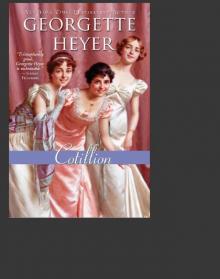 Cotillion
Cotillion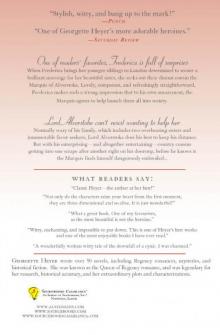 Frederica
Frederica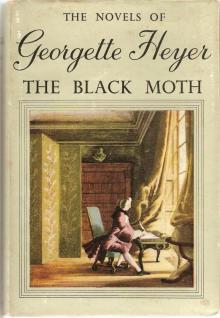 The Black Moth: A Romance of the XVIIIth Century
The Black Moth: A Romance of the XVIIIth Century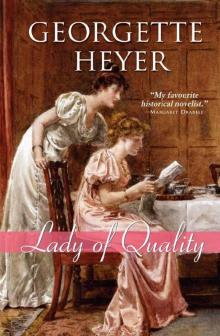 Lady of Quality
Lady of Quality Snowdrift and Other Stories
Snowdrift and Other Stories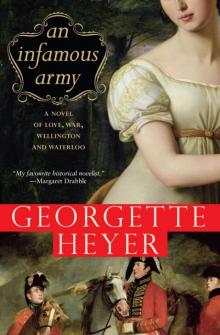 An Infamous Army
An Infamous Army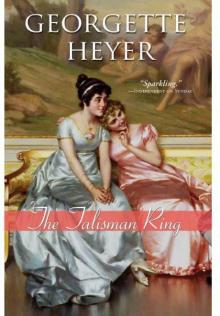 The Talisman Ring
The Talisman Ring Venetia
Venetia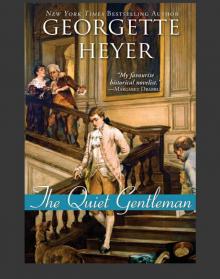 The Quiet Gentleman
The Quiet Gentleman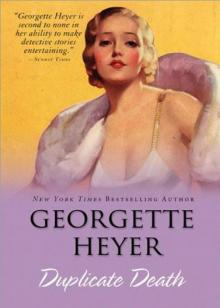 Duplicate Death
Duplicate Death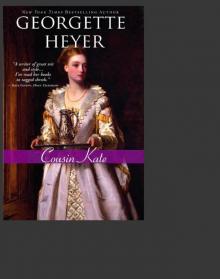 Cousin Kate
Cousin Kate Black Sheep
Black Sheep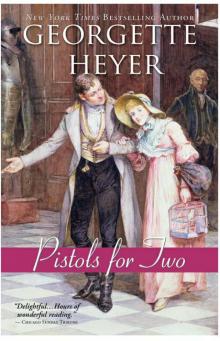 Pistols for Two
Pistols for Two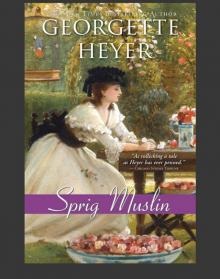 Sprig Muslin
Sprig Muslin No Wind of Blame
No Wind of Blame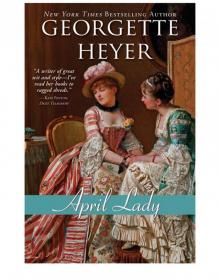 April Lady
April Lady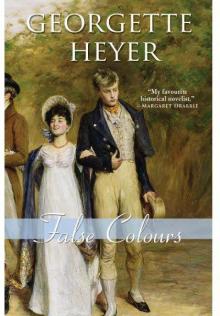 False Colours
False Colours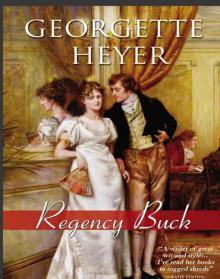 Regency Buck
Regency Buck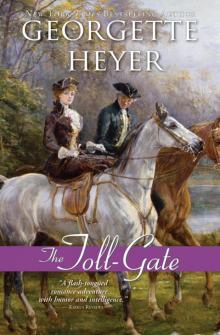 The Toll-Gate
The Toll-Gate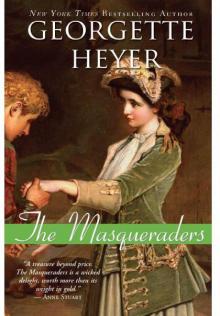 The Masqueraders
The Masqueraders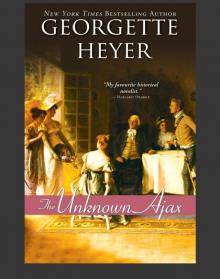 The Unknown Ajax
The Unknown Ajax The Grand Sophy
The Grand Sophy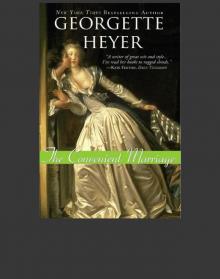 The Convenient Marriage
The Convenient Marriage Faro's Daughter
Faro's Daughter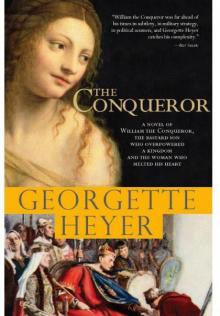 The Conqueror
The Conqueror The Foundling
The Foundling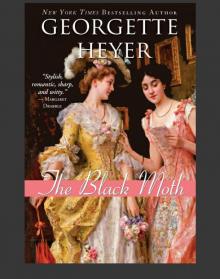 The Black Moth
The Black Moth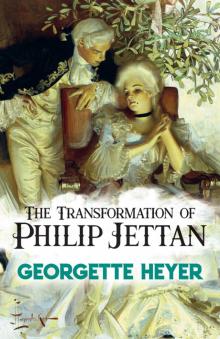 The Transformation of Philip Jettan
The Transformation of Philip Jettan Friday's Child
Friday's Child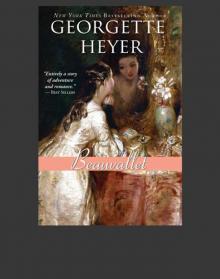 Beauvallet
Beauvallet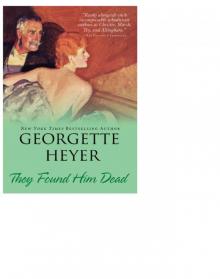 They Found Him Dead
They Found Him Dead Charity Girl
Charity Girl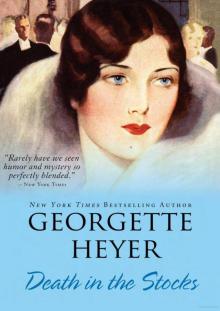 Death in the Stocks: Merely Murder
Death in the Stocks: Merely Murder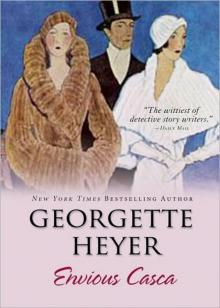 Envious Casca
Envious Casca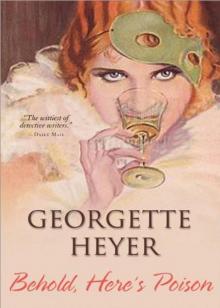 Behold, Here's Poison
Behold, Here's Poison Arabella
Arabella The Nonesuch
The Nonesuch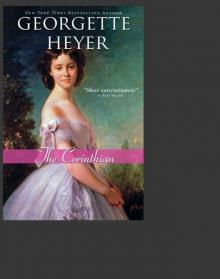 The Corinthian
The Corinthian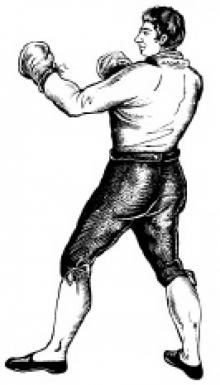 Jennifer Kloester
Jennifer Kloester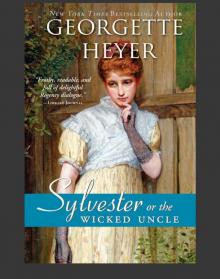 Sylvester
Sylvester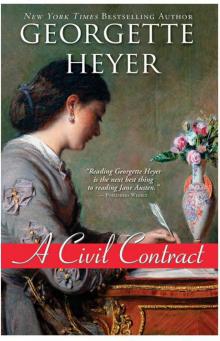 A Civil Contract
A Civil Contract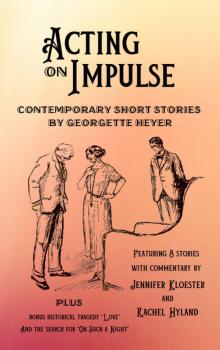 Acting on Impulse
Acting on Impulse Devil’s Cub at-2
Devil’s Cub at-2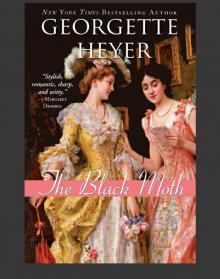 Black Moth
Black Moth Grand Sophy
Grand Sophy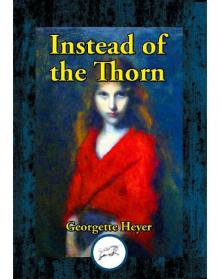 Instead of the Thorn
Instead of the Thorn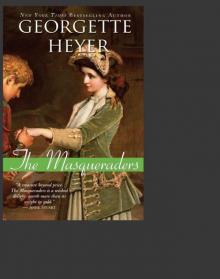 Masqueraders
Masqueraders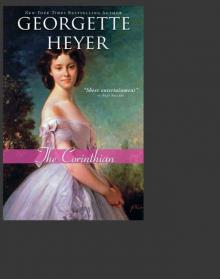 Corinthian
Corinthian Reluctant Widow
Reluctant Widow